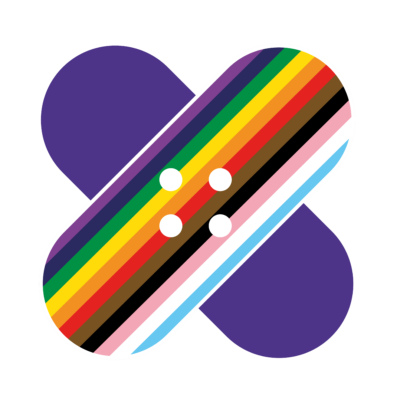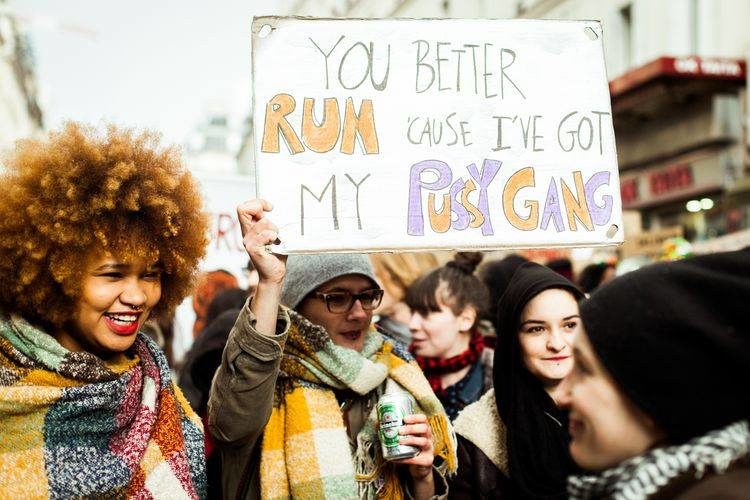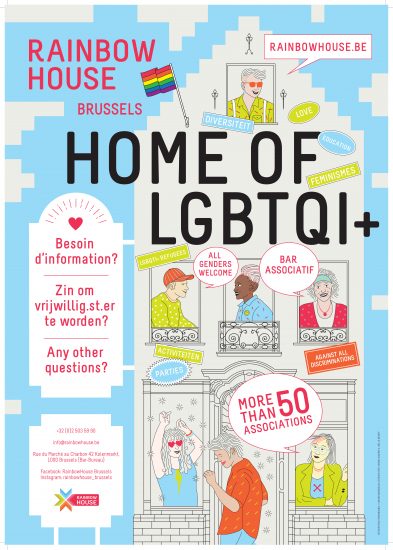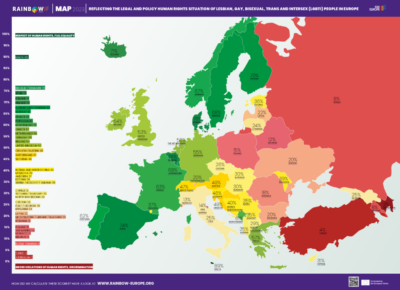POLITICAL REVENDICATIONS OF THE LGBTQI+ MOVEMENT
published on 2 May 2018
#YourLocalPower
Our revendications for municipal and local authorities, as part of Pride 2018 and the preparation of municipal elections.
People’s lives are determined first and foremost in their streets, neighborhoods, towns or cities, whether they live or stay. A local policy therefore has a huge impact on the daily lives of every citizen, including the population of LGBTQI +. That’s why the Belgian Pride puts 2018 municipalities and cities under the spotlight, or better yet: under the rainbow!
At the federal and social level, the past 15 years have been strongly committed to improving legislation to promote equality and respect for LGBTQI + people. Our laws have made great strides forward, but society does not always follow suit at the same pace. And we note that the feeling of well-being or security for LGBTQI + is not progressing, as the studies of the European Union Agency for Fundamental Rights (FRA) attest. Heterosexuality remains the norm, the binary thought in woman-man is well anchored and maintained in mentalities. Still more than half of LGBTQI + people do not dare to come out in the workplace. The number of suicides remains very high, adolescents are particularly affected. And after every homosexual, bi-, trans- or inter-phobic aggression on the street, the usual reaction is heard: “you’d better not walk anywhere hand in hand”. The most precarious of us remain the most affected and victims of these discriminations.
Municipalities and local institutions can and must make a difference and, above all, take responsibility for the well-being of all their inhabitants! Most of the measures below aim to ensure the prevention or response to acts (discrimination, harassment, stigmatization) that constitute crimes. Although the following list is not entirely exhaustive, it does show the extent of the work still to be done.
1.A structural policy of equal opportunities for the municipality
- The municipality must have a department in charge of equal opportunities in its administration, as well as an alderman explicitly in charge of equal opportunities;
- The municipality must have an action plan for the emancipation and equality of all;
- Ideally, this plan should cover sexual orientations, gender identities, sexual characteristics and all LGBTQI + people, regardless of their social status (sex workers, migrants, refugees, etc.), but also all other aspects of the identities of the residents of the commune, recognizing their plural and intersectional character;
- This plan must particularly specify the measures concerning the themes listed in the present claims, by associating a schedule and a budget;
- This plan must be a tool in the hands of the alderman and the department in charge, to allow them to solicit other services and to weigh for the allocation of effective means to actions really promoting the emancipation and the equality;
- This plan should aim to promote a “mainstreaming” and evaluation approach, rather than to multiply new actions. This is not necessarily a costly process. On the other hand, it must take up and extend the logic of the “gender-sensitive” budget to assess the impact of actions financed on equality;
- The service in charge of equal opportunities must be able to receive complaints about discrimination and stigmatization (of users or employees of the municipality) through a system accessible in all services managed directly. by the municipality or by delegation by another operator (inter-municipal, non-profit organization, etc.);
- The municipality undertakes to follow the commitments that have already been made and ensures the evaluation of the policies carried out on these subjects.
2.The municipality supports its agents!
- Most of the information and training measures that appear in this document enable municipal officials to better know how to react to situations encountered in the performance of their duties;
- The commune also has, among its agents, LGBTQI + people as well as other minority identities:
- These officers must be able to be safe in the performance of their duties and benefit, where appropriate, from the complaint system described in point 1;
- These agents, during recruitment or career development, must be able to benefit from a strong Commune commitment to good representativeness and equal treatment;
- To this end, the municipality must adopt and implement a Diversity Plan as proposed by the Brussels-Capital Region. One of the axes of the Diversity Plan concerns “openness to LGBT people”.
3.The municipality commits to visibility and participation in cultural activities
- Cultural programming must be thought of:
- To representatively host all identities;
- To address all the public of the municipality;
- This applies to live entertainment, exhibitions, debates, as well as public libraries and libraries;
- This is done throughout the year, although some periods may be more intense (examples: March 8, PrideFestival).
4.The municipality offers a welcome adapted to the inhabitants.
This point applies particularly to reception in the services of the population (Belgian and foreign) and civil status.
- The municipality regularly ensures that its staff, in the various departments, is trained to welcome all audiences in terms and in a manner fully respectful of their identities and their experiences;
- To do this, the municipality must be able to collect feedback from residents on their experience at the reception;
- The municipality must also be able to analyze the complaints received by its service in charge of equal opportunities, by the local employment agencies or a delegated service, for example an Ombudsman service;
- The municipality ensures that developments in the law are fully taken into account and that its staff has access to the necessary training (example: the new law on the change of civil status of transgender people);
- The municipality also ensures, in all the points of reception of the inhabitants (general reception, district antennas, etc.) that visible information is available for the persons who wish to file a complaint for discrimination or to report an abuse, informing them of their rights, remedies and possible supports, and grounds of discrimination recognized by law.
5.The municipality facilitates the reception of children and families at school and in nurseries
- The municipality ensures that teaching and non-teaching staff receive information and training on the respect due to all audiences;
- This should explicitly include the reception of families in which at least one parent is LGBTQI +;
- This must also take into account the case of children with LGBTQI + or non-binary identity, to react to any case of stigmatization or harassment, whatever its origin;
- This should also include a better representation of the diversity of family models, gender identities and sexual orientations in the teaching materials used or made available by the communal schools (books, exercises, posters, etc.);
- The municipality ensures that the communal schools systematize the EVRAS programs.
6.The municipality commits itself for the safety of all on public roads
- The municipality uses its representation in the instances of the police zone:
- To ensure that officers receive adequate training for the reception of LGBTQI + persons and all persons with a minority status, especially when they come to denounce acts of discrimination, stigmatization or discriminatory violence (workers sex, migrants, refugees, etc.);
- To ensure the presence of specialized referees on LGBTQI + issues;
- To ensure that reception in the police stations provides visible information on the rights of the minority victims of discrimination and violence, and on the associative structures that can accompany them;
- The municipality raises the awareness of its peacekeepers and the social workers it directly employs or who report to subsidiary associations (such as the non-profit organization BRAVVO in Brussels-City) to situations of discrimination and violence experienced by LGBTQI + people and other minorized persons;
- The municipality is committed to an integrated approach to its neighborhoods, aiming to respect the rights of all concerned (residents, businesses, sex workers, homeless people, etc.).
7.The municipality acts for an inclusive social action of all
The municipalities are responsible, in direct management, by delegation to subsidiary associations, or through the CPAS, many services hosting thousands of users. These people are often among those who are more vulnerable than average because of their social situation. LGBTQI + people and other underprivileged people who use these services may therefore accumulate several factors of social vulnerability.
- The municipality commits itself to the optimal training of all the reception staff concerned, taking over, when they exist, the teaching and training tools offered by the associations:
- In his services in Communal House;
- At the CPAS;
- In organizations offering services to children and young people, especially houses and youth information points;
- In residential or residential institutions for the elderly;
- The municipality carries out, concerning these same services:
- A needs assessment and inquires with the relevant associations in the Brussels Region (Minority Associations and relevant professional associations);
- An analysis of good practices identified in Belgium and Europe (many European projects have carried out inventories of practices concerning various communities, as well as European or international recommendations);
- A prioritization of actions to put in place.
8.The municipality publicly takes a stand for equality and emancipation
- The municipality clearly shows its support for these causes:
- By displaying the symbols of the minority communities during their main events (examples: international days, Belgian Pride, etc.), using, as the case may be, its buildings (flags) or communication media (communal newspaper, etc.) ;
- Making available to the public information on the LGBTQI + associative movement and other minority groups in its public reception facilities;
- The municipality acknowledges receipt and endeavors to respond to requests from associations from minority communities:
- For access to public infrastructures;
- For institutional representation at events organized by this community, including health and prevention of people (example: HIV / AIDS prevention, refusal of serophobia);
- For the participation of municipal institutions in relevant information and awareness campaigns;
- For equal access, with equal project quality, to communal subsidies;
- Communal authorities express themselves clearly and visibly in response to possible incidents of stigmatization and discrimination in their territory;
- The commune is part of the dynamics of improving the real situation of LGBTQI + people, by soliciting the latter or by supporting community-based public health initiatives (such as the 2017 Community Declaration of Paris).
9.A “hospitable” municipality
- The municipality participates in the reception of LGBTQI + applicants for international protection: it tries, to the extent of its means and in collaboration with the federal level of power, to create a Local Welcoming Initiative (“LWI “), which we consider to be the most appropriate structure for the particularities of LGBT audiences.







